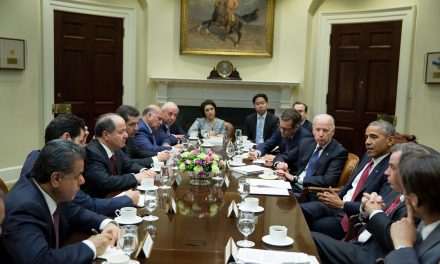Many Iraqi observers warned months ahead of May’s general elections that the inevitably messy government formation process must not be allowed to distract leadership away from security matters. Our fears appear to have not been unfounded. Since the holy month of Ramadhan ended, Da’ish cells across the country seem to have launched a mercilessly calculated kidnapping campaign that has resulted in dozens of casualties so far, mainly in and around central Iraq.
Prime Minister Haider Al-Abadi rightly congratulated Iraqi security forces for their hard work in securing Eid Al-Fitr celebrations over the weekend during his weekly press conference and such an achievement should not be overlooked. In the years leading up to and after the American withdrawal from Iraq, the holy month of Ramadhan would witness on average around 250-300 fatalities due to violence and terrorism. This figure was more than tripled in 2013 and 2015 while Ramadhan in 2014 witnessed more than 1,300 fatalities, as the Da’ish takeover, subsequent massacres and the fight for liberation gripped the country. This year, that figure has hovered around 100, marking a significant decrease in violence and a huge victory for the Iraqi security and intelligence forces, as well as the commander-in-chief.
However, the fledgling Da’ish insurgency has begun to take shape at a steadily faster pace and we seem to be experiencing the group’s first semi-major terror campaign since they lost their last bastion around Iraq. In the week since the holy month ended, there have been reports of Da’ish units kidnapping more than 30 individuals in central and western Iraq. Reports regarding who kidnapped these people, where and why have often conflicted but the details available point towards either a long-term shift in tactics or a concerted campaign to sow the seeds of fear back into rural Sunni communities across Iraq.
Over the last two years, since the Iraqi offensive to retake the north and west picked up strong momentum, Da’ish brushed the dust off the old Al-Qaeda playbook and began assassinating influential figures and mukhtars in Sunni villages in and around Baghdad, Salahuddin, Anbar, Diyala, Kirkuk and Ninawa. Mukhtars are village chiefs who can hold a substantial amount of authority in their areas. Killing mukhtars who are perceived as unwilling to side with Da’ish or at least turn a blind eye to their activities is a tactic honed by Salafi terrorists in Iraq for over a decade and it tends to leave the village in a state of disarray and terror, allowing Da’ish and their predecessors to feed off these emotions and move into a village that at one point would have put up resistance. Sometimes, multiple mukhtars in a village would be assassinated in quick succession until nobody would go near the job, allowing Da’ish to put their own man in the position or just leave it vacated.
Well, at least three mukhtars were killed this week in Salahuddin province alone. In a raid on the village of Abu ‘Aqarib near Shirqat, the mukhtar and six other civilians were kidnapped and later executed by Da’ish terrorists. The mukhtar of another village in the Shirqat region was also kidnapped and later found dead. Da’ish militants also took the mukhtar of the village of Sadrah, which lies near the border between Salahuddin and Diyala provinces, before executing him in the Himreen mountains region.
There were also disturbing reports of Da’ish executing three truck drivers on the Baghdad-Kirkuk highway near Riyadh for being Shi’a Muslims from southern Iraq in addition to a member of Iraq’s security forces who was heading south on leave. Da’ish propaganda exaggerated the success of their operations as usual, boasting about capturing and executing dozens of Iraqi soldiers and Hashd (PMUs) “militiamen” along the highway. Their claims were discredited by both local and military sources.
These ambushes are usually carried out via small Da’ish units disguised as Iraqi soldiers who set up fake checkpoints along the highway. Once valuable targets are identified, more militants waiting nearby arrive at the checkpoint and kidnap them. If vehicles refuse to stop or attempt to drive away once they realise what is going on, they are fired upon.
Western Anbar province has also seen a number of kidnappings. Da’ish militants kidnapped six men who defied security forces’ warnings and went west of Rutba to inspect their construction plants. Four men were reportedly ambushed in Al-Qa’im near the border with Syria on Wednesday. Meanwhile, the head of Diyala Operations Command, Lt. Gen. Al-‘Azawi confirmed that Da’ish members had disguised themselves as Iraqi security forces in order to kidnap civilians at fake checkpoints along portions of the Baghdad-Kirkuk highway that run through Diyala province. He also requested reinforcements to join his forces from Baghdad in order to properly secure the highway.
In one disturbing case early in the week, news surfaced of ten civilians being kidnapped and later executed at one such fake checkpoint near the Makhoul Mountains. In a far more unsettling case, members of the Shammar tribe declared that Da’ish had kidnapped more than 30 sheepherders in the Tharthar region, north of Ramadi. While the number has been questioned, at least six of those men were found executed in Hatra in southern Ninawa province, hands tied behind their backs with bullets in their heads, dumped by the side of a road.
The Shammars are the largest and most influential tribe in Iraq and the Salahuddin branches have largely fought and resisted the presence of Da’ish in their areas, especially in Salahuddin province. Many of them have enlisted in the Hashd Al-Sha’abi in order to receive the backing they needed to stand up to Da’ish. It seems that the militants have decided to make an example of this tribe, using their blood to send a message to other tribes in the province.
The Tilul Al-Baj area, southwest of Shirqat, witnessed clashes between Shammar tribesmen and Da’ish, as militants tried to sneak into the area to carry out a terrorist attack. Three Da’ish militants were killed. However, in a separate attack on the same area, five civilians were kidnapped by Da’ish from two small villages, and taken deep into the western desert. The Shammar tribe has been very vocal, holding the government responsible for these security failures and has asked Prime Minister Al-Abadi to personally intervene by either sending reinforcements to the “Al-Jazirah” desert region that stretches north from Anbar all the way to southern Ninawa (to the west of Salahuddin province) or allowing the tribe to form its own paramilitary security contingents to defend their areas from Da’ish. This unpopulated expanse of desert is home to several Da’ish training camps and staging areas for assaults into nearby provinces.
A steady stream of intelligence reports have indicated that while Da’ish holds no significant ground in Iraq, their spectral presence in remote desert and rural areas poses a grave threat to the country’s stability. The last week has proven that Da’ish has not been completely uprooted in northern Salahuddin, southern Ninawa and other trouble spots. Iraqi leadership must not let the government formation drama reverse hard won victories and cheapen the blood of the martyrs who sacrificed everything for the sake of Iraq. Counter-terrorism forces that have been bafflingly tasked with protecting Kirkuk city must be swapped with a more appropriate force and reassigned to doing what they do best, hunting down Da’ish terror cells in Shirqat, the Himreen mountains, Diyala province, Al-Jazirah, western Anbar and the Sinjar region. Surveillance systems must be erected along the Baghdad-Kirkuk highway amidst a crackdown on illegal checkpoints and clearing operations in the villages adjacent to the highway in order to weed out these terror cells once and for all.

Haidar Sumeri
Haidar Sumeri is a Middle East observer, mainly focusing on Iraq’s war on terrorism.










